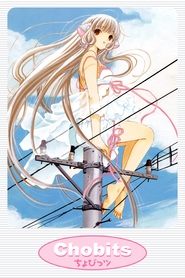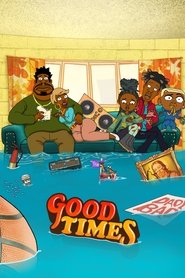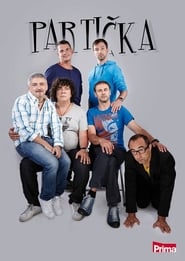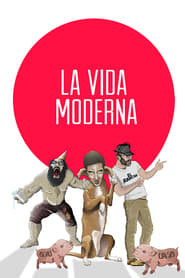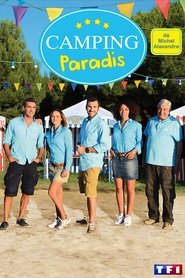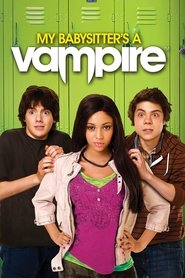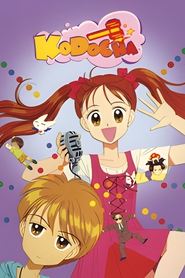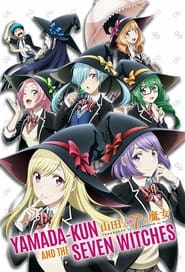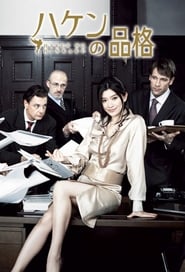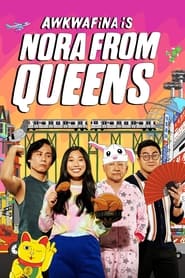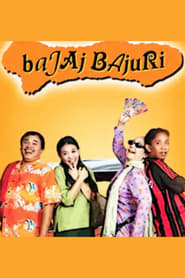Comedy TV Series - Page 94
-
Chobits
2002
Chobits
2002
star 8.1Tokyo is abuzz with persocoms – humanoid computers that are virtually perfect. The socially and technologically inept Hideki is dying to get his hands on one. When he finds Chii abandoned in the trash, she’s cuter than any current model he’s ever seen before. But when he gets her home and turns her on, she has no data and only a single learning program installed. While Hideki puts his whole heart into teaching Chii the ins and outs of humanity, a mystery unfolds as a dark secret within her awakens. -
Good Times
2024
Good Times
2024
star 6.1In this edgy, irreverent reimagining of the TV classic, a new generation of the Evans family keeps their heads above water in a Chicago housing project. -
KVN
1961
KVN
1961
star 6.5KVN is a Russian humour TV show and competition where teams compete by giving funny answers to questions and showing prepared sketches. The programme was first aired by the First Soviet Channel on November 8, 1961. Eleven years later, in 1972, when few programmes were being broadcast live, Soviet censors found the students' impromptu jokes offensive and anti-Soviet and banned KVN. The show was revived fourteen years later during the Perestroika era in 1986, with Alexander Maslyakov as its host. It is one of the longest-running TV programmes on Russian Television. It also has its own holiday on November 8, the birthday of the game, which KVN players celebrate every year since it was announced and widely celebrated for the first time in 2001. -
Man with a Plan
2016
Man with a Plan
2016
star 6.7A dad finds out that parenting is harder than he thought after his wife goes back to work and he's left at home to take care of the kids. -
Ah! My Goddess
2005
Ah! My Goddess
2005
star 7.4Keiichi Morisato is looking forward to university life. But in reality, he has no luck in anything, and he has trouble with clubs, love, etc. The truth is that he has an unlucky star above his head. One day, Keiichi is stuck watching the dorm while his sempai are away, and has a mountain of chores to do to boot. But Keiichi is a good-natured person, and is set about doing his duties. As he is about to finish his final chore, he makes a phone call to his sempai. But the words that came through the receiver are, 'Goddess Help Line.' Shortly afterwards, a beautiful goddess named Belldandy appears in front of him from the mirror of his room. -
Partička
2011
Partička
2011
star 4.5Partička is an improvisation show of Prima TV, based on the Slovak version of the same name. The entire program is based on the improvisation of four actors in different games. As in the Slovak version, Daniel Dangl accompanies the show, and Marián Čurko is the music. -
Baa Bahoo Aur Baby
2005
Baa Bahoo Aur Baby
2005
star 4.5Baa Bahoo Aur Baby was as a popular comedy drama, broadcast on India's Star Plus channel between 2005 and 2010. The series revolved around the fictitious Thakkar family, living in a large house in Parla East, Mumbai. -
Boris
2007
Boris
2007
star 8.6Boris is an Italian television series created by Luca Manzi and Carlo Mazzotta, initially produced from 2007 to 2010, with a revival season premiered in 2022. The show brings to the stage the behind the scenes of a television set where a troupe is shooting Gli occhi del cuore 2 (The eyes of the heart 2), a satirical portrait of the many fictions airing on the Italian TV networks. -
The Modern Life
2015
-
Destinos Cruzados
2013
Destinos Cruzados
2013
-
Up All Night
2011
Up All Night
2011
star 6An irreverent look at parenthood through the point of view of an acerbic working mother, along with her stay-at-home husband and opinionated parents. -
Camping paradis
2006
-
My Babysitter's a Vampire
2011
star 8.1Ethan, Benny and fledgling vampire Sarah battle zombies, demons and the other supernatural beasties that regularly threaten their school. -
Kodocha
1996
Kodocha
1996
star 7.1Sana Kurata has a charmed life. Not only is her mother is a famous, award-winning writer, but she's the star of the hit TV comedy "Child's Toy" while still in the fifth grade. But Sana's biggest concern is Akito Hayama, a pint-sized hellion who's organized the boys in their grade-school class into a mass of unending noise and violence. With the help of Rei, her manager, chauffeur and "pimp," Sana is determined to win back control of the classroom from her new arch-enemy. But as her crusade continues, Sana moves further into Akito's life, and finds that he might not be entirely bad...or entirely safe. -
Yamada-kun and the Seven Witches
2015
star 8.3One day, high-school boy Yamada bumps into the beautiful girl Shiraishi on the stairs (literally), and their lips touch as they fall. When they regain their wits, they realize that they have swapped bodies. As time progresses, the two realize that this is not the only mysterious happening in the school. -
Haken no Hinkaku
2007
Haken no Hinkaku
2007
star 7.3Oomae Haruko is an A+ Temp worker who never cracks a smile or minces words, and leaves work on the dot. But her cynical nature indicates she has something painful to hide. Satonaka Kensuke has just been promoted to head S&F's new Marketing Division. Saddled with a rag-tag group of subordinates, he is struggling to lift his division off the ground. When Oomae is placed in Kensuke's department, she finds herself doing more work than she's ever done before. This is a timely drama that examines the different attitudes toward temp workers and regular employees, and the ways to overcome frictions in interpersonal relationships. This follows an October report on labor conditions by the Labor Ministry, which showed that, after regulations were relaxed, the proportion of regular employees to Temps had doubled compared to that of eight years ago. -
Awkwafina Is Nora from Queens
2020
star 6.8Nora Lin leans on her family as she navigates life and young adulthood in outer borough-NYC. -
Lady Georgie
1983
Lady Georgie
1983
star 7.1An Australian farmer returns home from the woods with a baby named Georgie. The girl lives ignoring the terrible secret hidden in the golden bracelet on her hand. Her "Father" and Her "brothers", Abel and Arthur, love her dearly, but her "mother" considers her an intruder and doesn't manage to open her heart to the girl. After Father dies in an attempt to rescue Georgie, Mother starts hating the girl. Georgie grows up into a beautiful young girl, and both her "brothers" are terribly in love with her. Not knowing the truth Georgie eventually falls in love with the handsome grandson of the British Governor. When Mother finally reveals the truth to her and condamns the girl for being an exile's daughter, Georgie leaves for Britain in search of her real parents - and for her love, who has also left Australia. Abel and Arthur follow her and the three are thrown into the cruel world of London aristocracy, lies and intrigues. -
The Parent 'Hood
1995
The Parent 'Hood
1995
star 7.3The Parent 'Hood is an American sitcom that aired on The WB airing from January 18, 1995 to July 25, 1999. The series starred Robert Townsend and Suzzanne Douglas. Originally to have been titled Father Knows Nothing, the series was one of the four sitcoms that aired as part of the original Wednesday night two-hour lineup that helped launch The WB network. -
Bajaj Bajuri
2002
Bajaj Bajuri
2002
This sitcom soap opera tells the story of a simple mixed Betawi and Sundanese family, namely the Bajuri and Oneng families, who earn just barely because the husband is just a bajaj driver while the wife runs a small salon. They live at home with Eti, Oneng's mother, who is usually called Emak. Their simple lives and their surrounding environment are shown to illustrate the situation of the suburban communities in Jakarta.
